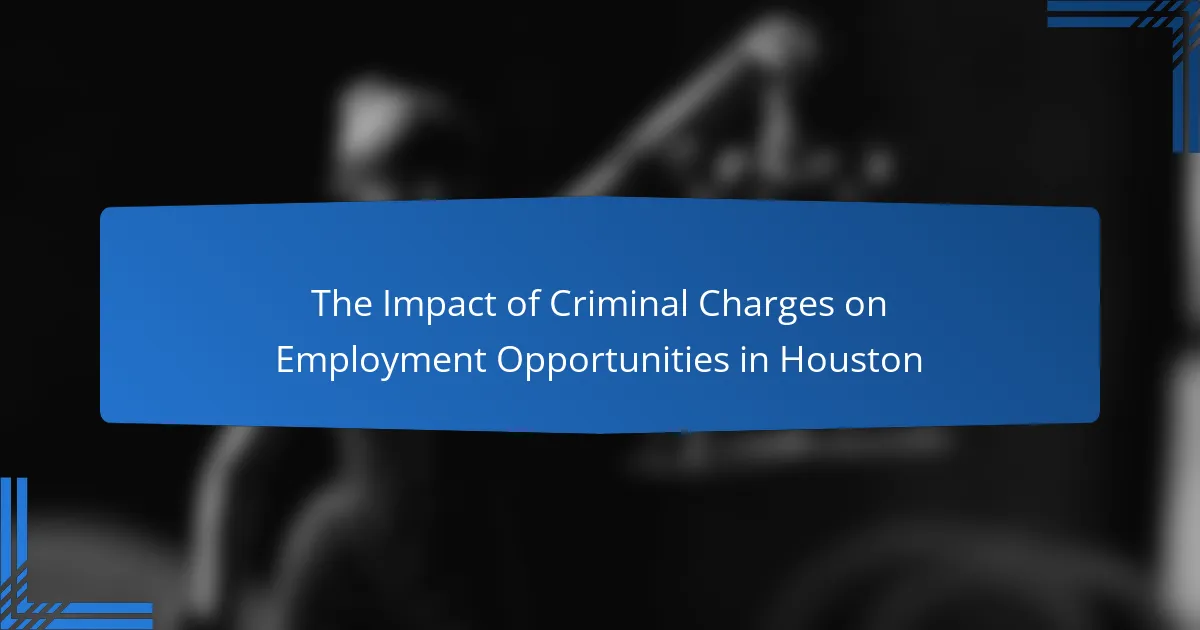In Houston, criminal charges can severely restrict employment opportunities, as many employers utilize background checks that may disqualify candidates with a criminal history. The extent of this impact often depends on the nature of the charges and the specific policies of the industry or employer. However, Texas laws provide some protections for job seekers with criminal records, aiming to prevent discrimination based solely on past convictions.
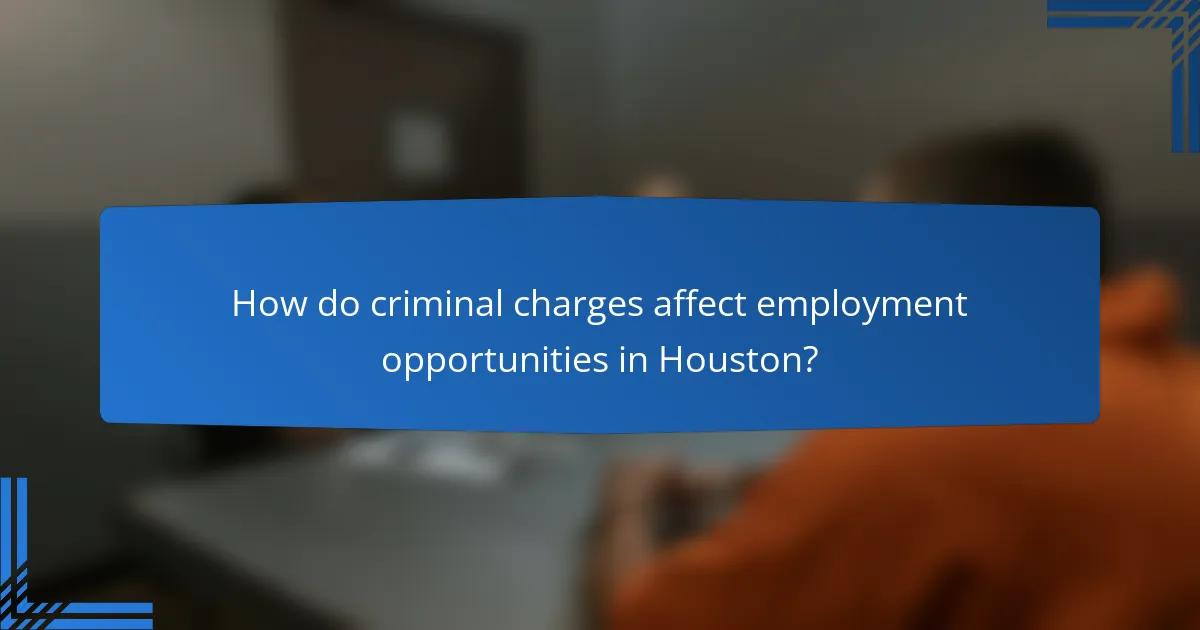
How do criminal charges affect employment opportunities in Houston?
Criminal charges can significantly limit employment opportunities in Houston, as many employers conduct background checks and may disqualify applicants with a criminal record. The impact varies depending on the nature of the charges, the industry, and the specific employer’s policies.
Negative impact on job applications
Job applications often require candidates to disclose any criminal history, which can lead to automatic disqualification for many positions. Employers in sectors such as finance, healthcare, and education may be particularly stringent, as they often prioritize trust and safety.
Additionally, applicants with criminal records may face challenges in competing against candidates without such histories. This can result in lower chances of securing interviews and job offers, especially in a competitive job market like Houston.
Employer perceptions of criminal records
Employers may perceive criminal records as indicators of unreliability or risk, which can influence hiring decisions. Many employers are concerned about potential liability and the impact on workplace culture, leading them to favor candidates with clean records.
However, some employers are becoming more open to hiring individuals with criminal backgrounds, especially if the charges are minor or if a significant amount of time has passed since the offense. Programs aimed at reintegrating former offenders into the workforce are also gaining traction, offering support and resources for both employers and job seekers.
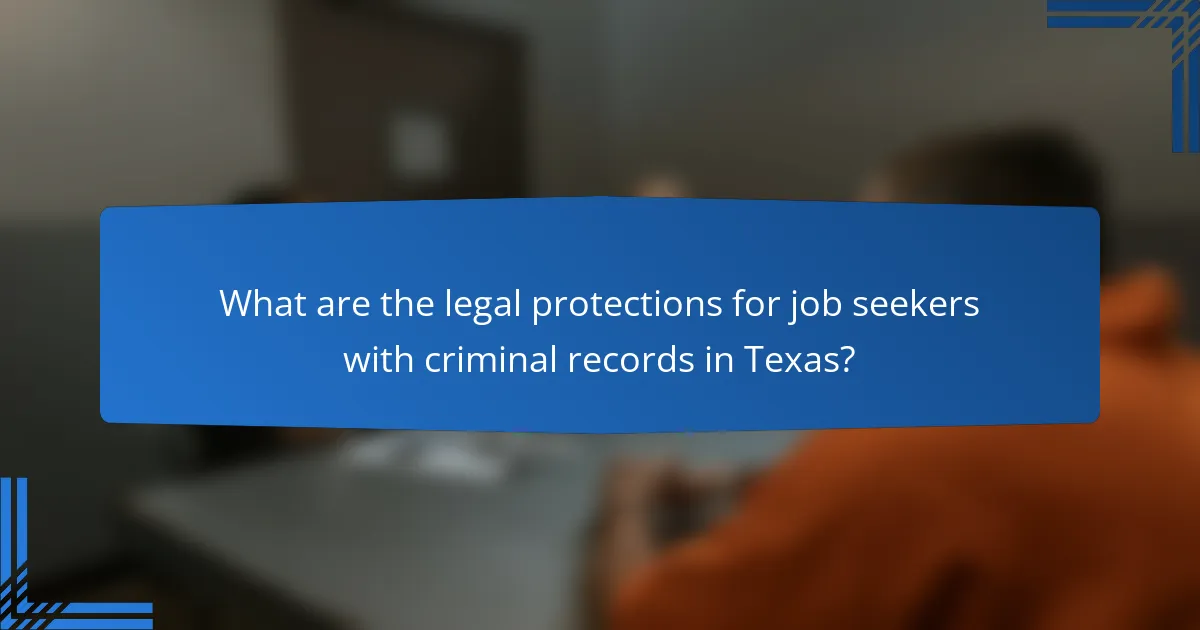
What are the legal protections for job seekers with criminal records in Texas?
In Texas, job seekers with criminal records are protected by various laws that aim to prevent discrimination based on past convictions. These protections help ensure that individuals are not unfairly denied employment opportunities solely due to their criminal history.
Texas Fair Chance Hiring Law
The Texas Fair Chance Hiring Law prohibits employers from inquiring about an applicant’s criminal history on job applications. This law applies to employers with 15 or more employees and encourages a fair evaluation of candidates based on their qualifications rather than their past offenses.
Under this law, employers can only conduct background checks after a conditional job offer has been made. This allows candidates to demonstrate their skills and suitability for the position before their criminal history is considered.
Equal Employment Opportunity Commission guidelines
The Equal Employment Opportunity Commission (EEOC) provides guidelines that discourage discrimination against individuals with criminal records. Employers must ensure that their hiring practices do not disproportionately impact certain groups based on race or ethnicity.
Employers are encouraged to consider the nature of the crime, how long ago it occurred, and its relevance to the job in question. This approach helps create a more equitable hiring process while allowing employers to maintain workplace safety and integrity.
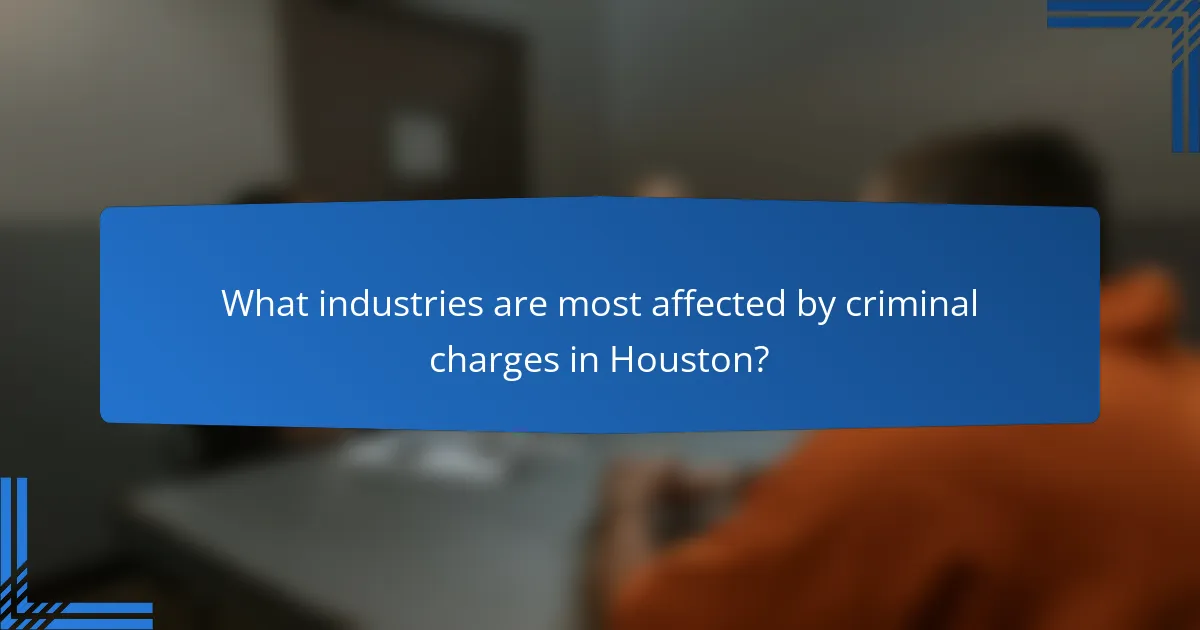
What industries are most affected by criminal charges in Houston?
In Houston, industries such as healthcare and education are significantly impacted by criminal charges. Employers in these sectors often have strict background check policies that can limit job opportunities for individuals with criminal records.
Healthcare sector restrictions
The healthcare sector in Houston imposes stringent regulations regarding criminal history. Positions that involve direct patient care, such as nursing or medical assistance, may require background checks that disqualify candidates with certain convictions, particularly felonies related to violence or substance abuse.
Additionally, licensing boards for healthcare professionals often have specific criteria regarding criminal history. For example, a felony conviction may lead to the denial of a medical license, making it crucial for individuals to understand the implications of their criminal record when pursuing careers in this field.
Education and childcare employment barriers
Employment in education and childcare in Houston is heavily influenced by criminal charges. Schools and daycare centers typically conduct thorough background checks to ensure the safety of children, which can result in disqualification for applicants with relevant criminal histories.
In Texas, individuals seeking employment in these sectors must be aware that certain offenses, particularly those involving minors, can lead to automatic disqualification from teaching or childcare roles. Understanding these barriers is essential for anyone with a criminal record looking to enter these professions.
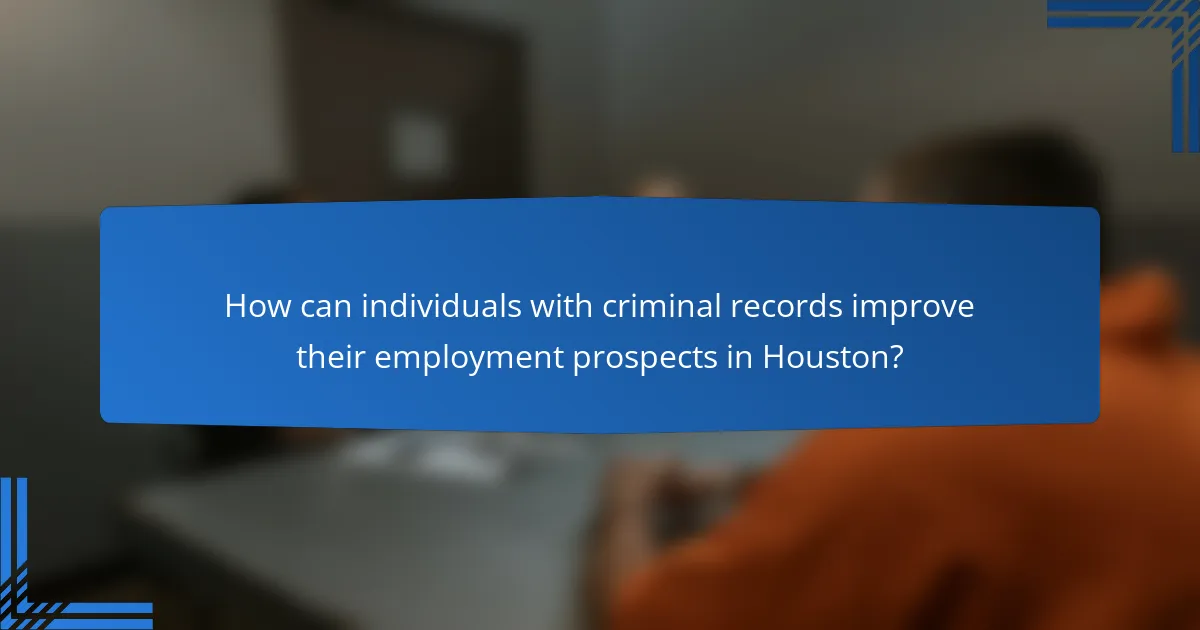
How can individuals with criminal records improve their employment prospects in Houston?
Individuals with criminal records in Houston can enhance their employment opportunities through various strategies, including expungement of their records and acquiring relevant skills or certifications. Taking proactive steps can significantly reduce the stigma associated with a criminal history and increase job market competitiveness.
Expungement and sealing of records
Expungement involves legally removing a criminal record from public view, while sealing restricts access to the record. In Texas, certain offenses may be eligible for expungement or sealing, which can help individuals present a cleaner background to potential employers.
To pursue expungement or sealing, individuals should gather necessary documents, such as court records and proof of rehabilitation. Consulting with a legal professional can help navigate the process effectively, ensuring all criteria are met.
Skills training and certifications
Acquiring new skills and certifications can significantly enhance employability for individuals with criminal records. Many organizations in Houston offer training programs that focus on in-demand fields, such as technology, healthcare, and skilled trades.
Participating in these programs not only builds expertise but also demonstrates commitment to personal and professional growth. Local community colleges and vocational schools often provide affordable options, and some may even offer financial assistance for those in need.
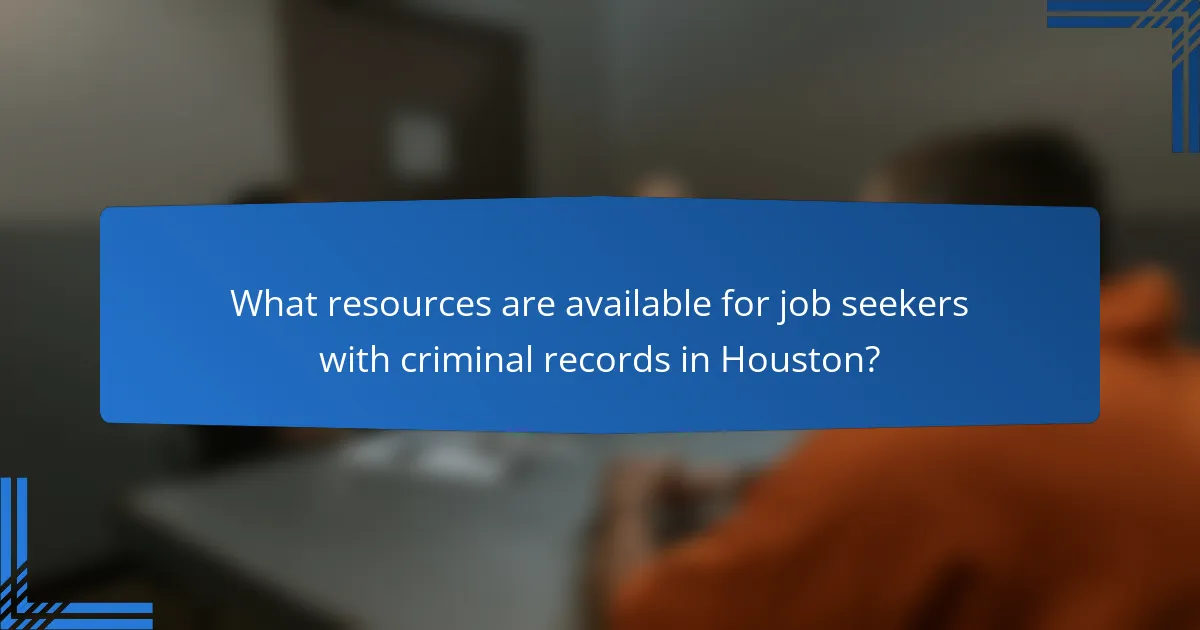
What resources are available for job seekers with criminal records in Houston?
Job seekers with criminal records in Houston can access various resources designed to assist them in finding employment. These resources include local nonprofit organizations and workforce development programs that offer support, training, and job placement services tailored to their needs.
Local nonprofit organizations
Several nonprofit organizations in Houston focus on helping individuals with criminal records reintegrate into the workforce. Organizations such as the Texas Offenders Reentry Initiative (T.O.R.I.) provide job readiness training, resume workshops, and connections to employers willing to hire individuals with criminal backgrounds.
Another notable organization is the Goodwill Industries of Houston, which offers job training programs and employment services specifically for those facing barriers to employment, including a criminal history. These nonprofits often collaborate with local businesses to create job opportunities for their clients.
Workforce development programs
Workforce development programs in Houston are designed to equip job seekers with the skills necessary to succeed in the job market. The Houston Workforce Solutions provides various services, including skills assessments, job training, and access to job fairs, specifically aimed at individuals with criminal records.
Additionally, programs like the Second Chance Program focus on providing specialized training and support for those with criminal histories. These initiatives often include partnerships with local employers who are open to hiring individuals who have faced legal challenges, thereby increasing the chances of successful employment outcomes.
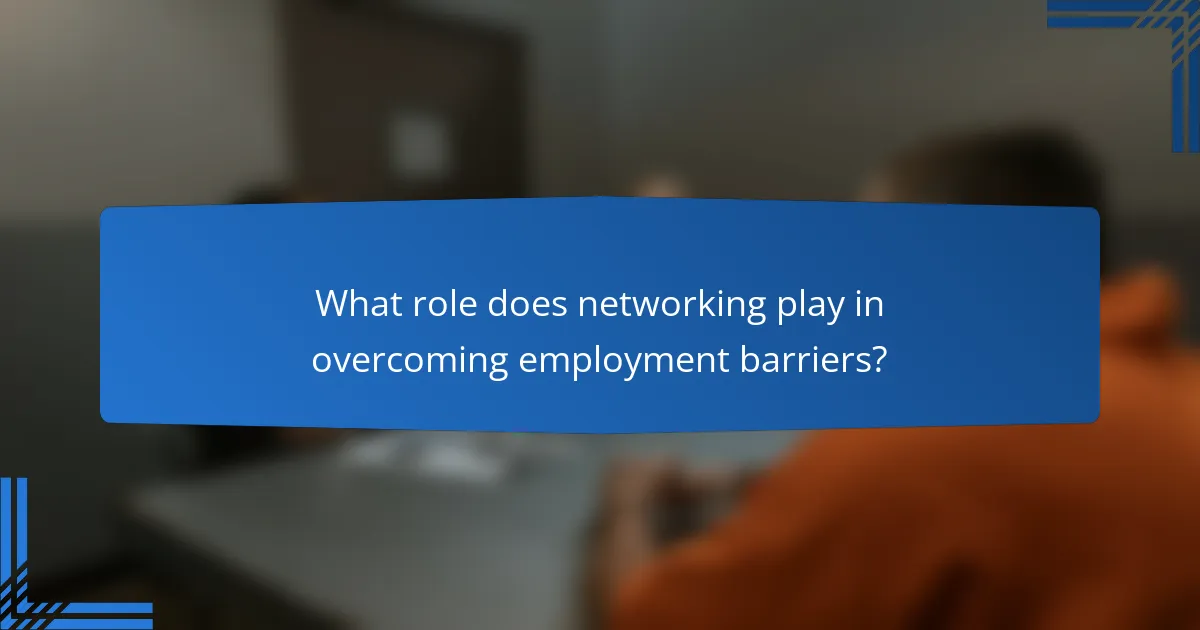
What role does networking play in overcoming employment barriers?
Networking is crucial for individuals facing employment barriers due to criminal charges, as it helps create opportunities and build trust with potential employers. By establishing connections within their industry, job seekers can gain insights, referrals, and even mentorship that can facilitate their job search.
Building professional connections
Building professional connections involves reaching out to individuals in your desired field, including former colleagues, industry peers, and local business leaders. Attend networking events, job fairs, and community gatherings in Houston to meet people who can provide valuable insights and job leads.
Consider joining local professional organizations or trade groups related to your career interests. These organizations often have resources for job seekers, including workshops, seminars, and networking events that can enhance your visibility and credibility.
Utilizing social media platforms
Social media platforms like LinkedIn can be powerful tools for overcoming employment barriers. Create a professional profile that highlights your skills, experiences, and any relevant volunteer work. Engage with industry-related content and connect with professionals in your field to expand your network.
Be mindful of how you present yourself online. Share positive updates about your career journey and participate in discussions to demonstrate your knowledge and enthusiasm. Avoid negative comments or content that could harm your professional image, as employers often review social media profiles during the hiring process.
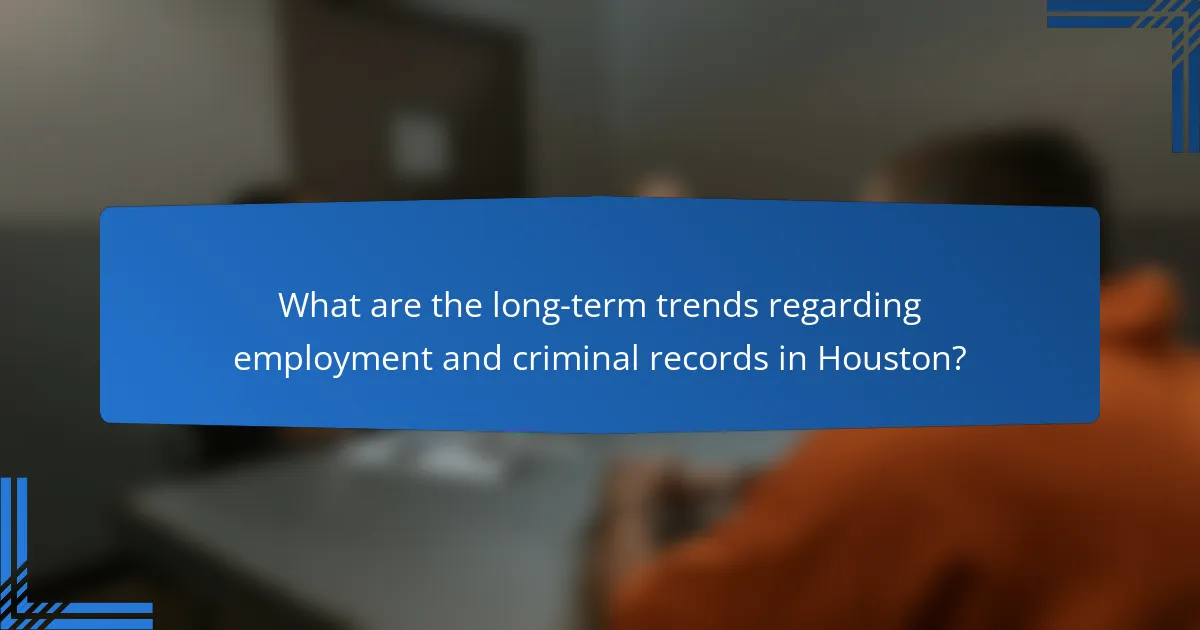
What are the long-term trends regarding employment and criminal records in Houston?
In Houston, the long-term trends indicate a growing recognition of the impact of criminal records on employment opportunities. Many employers are increasingly considering rehabilitation efforts and the potential of individuals with criminal backgrounds, leading to changes in hiring practices.
Increased employer awareness of rehabilitation
Employers in Houston are becoming more aware of rehabilitation programs and their effectiveness in helping individuals with criminal records reintegrate into the workforce. This shift is partly driven by initiatives aimed at reducing recidivism and promoting second chances.
As a result, many companies are now actively seeking candidates who have demonstrated personal growth and commitment to change. This trend can be seen in industries such as construction, hospitality, and retail, where employers are more willing to overlook past offenses in favor of skills and qualifications.
Shifts in hiring practices and policies
Hiring practices in Houston are evolving to become more inclusive of individuals with criminal records. Many organizations are adopting “ban the box” policies, which remove the criminal history question from initial job applications, allowing candidates to be evaluated based on their qualifications first.
Additionally, some employers are implementing training programs specifically designed for individuals with criminal backgrounds, helping them acquire necessary skills and improve their employability. This not only benefits the individuals but also addresses labor shortages in various sectors across the city.
